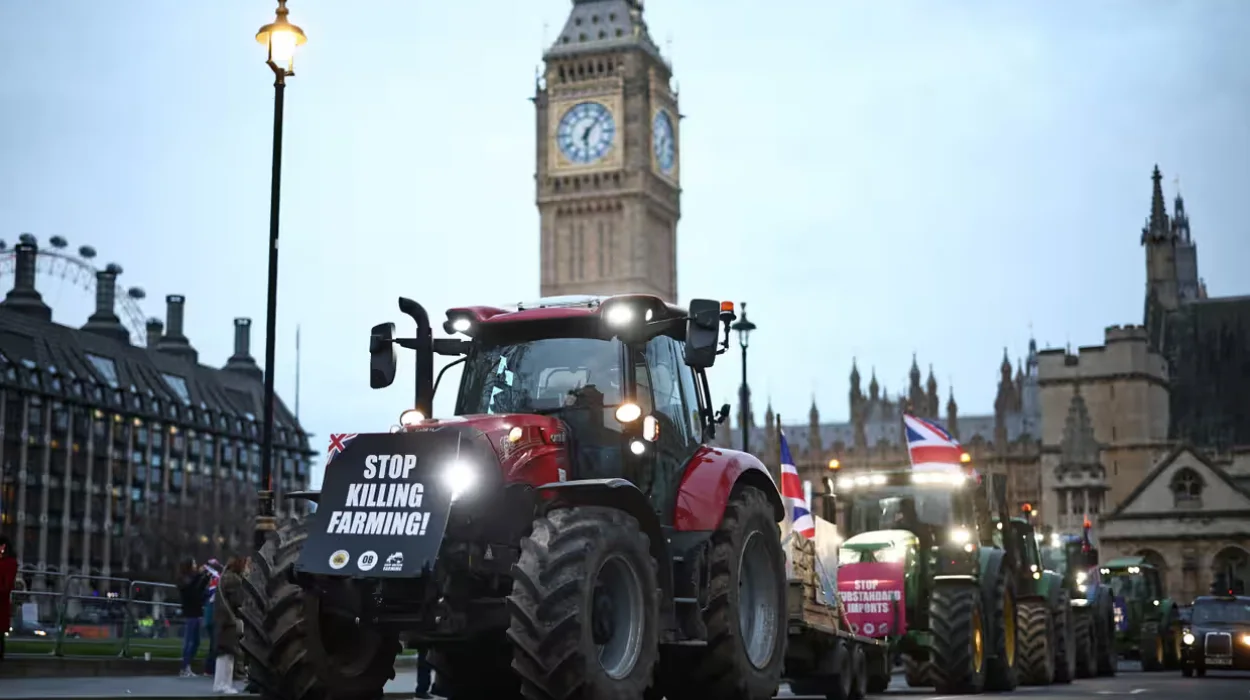UK (Parliament Politics Magazine): The Labour government proposes a new deal to help farmers earn more and be sustainable, but protests continue over unpopular tax and subsidy cuts.
Tens of thousands of farmers stage mass protests over controversial changes to agricultural inheritance tax and EU-linked subsidies, calling the policies ineffective.
As reported by The Guardian, at this Thursday’s Oxford Farming Conference, the environment secretary is expected to reveal a new agreement for farmers designed to enhance farm business “profitability and sustainability.”
The environment secretary, Steve Reed, seeks to ensure farmers are compensated more fairly and reduce their reliance on financial aid. He points out that under the EU’s agricultural policy, farmers were granted fixed payments per acre to keep them on the land and stabilise food costs.
The UK government has revamped its farming assistance, replacing flat payments with compensation for farmers who protect and safeguard nature. Devolved administrations operate their own subsidy systems, and England’s agriculture budget will reach £5bn over the next two years. A review is planned for 2025-26.
Studies reveal farmers earn just 1p for every loaf of bread or block of cheese sold. Fixing this gap could increase food prices or require exceptional government intervention in supply chains and retail businesses. At the same time, some critics argue that British consumers already pay too little for food, with only the US, Singapore, and Ireland spending a smaller portion of their income on groceries.
The National Farmers’ Union raised concerns over the government’s inheritance tax reforms, stating that it could harm many farmers with already low incomes. Starting in 2026, farms valued over £1m will face an inheritance tax of 20%, payable over a decade. Given that farms only make a 0.5% return on their land and equipment, these taxes may severely impact their financial situation.
Barnaby Coupe, the head of land use policy at The Wildlife Trusts, stated, “The government needs to outline a clear future for nature-friendly farm schemes as a matter of extreme urgency. The ambitions of too many farmers are being stifled by a lack of certainty about what actions will be available to them, and when they will be able to access payments.”
He added, “The government is expected to publish a farming roadmap early in 2025, and it is imperative that this comprises a predictable, long-term and sustainable plan to support farmers along the transition to nature-friendly and climate adapted farming.”
According to Riverford’s latest survey, 64% of UK fruit and vegetable farmers reported financial instability in 2024, a rise from 49% in 2023.
While protests continue over the tax changes, Mr Reed is reported to have decided not to alter the policy but will instead focus on enhancing farm profitability.
The British government will not change the reductions in flat payments for farmers as the EU system winds down. However, the Department for Environment, Food and Rural Affairs intends to trim 76% off the first £30,000 of payments for farmers for the 2025-26 year.
Environmental campaigners urged Mr Reed to address climate change’s effects on farming and support nature-friendly payments. Last winter, floods hit top farmland, and 2024’s harvest was the second worst. The Energy and Climate Intelligence Unit said this caused a £600m revenue loss for farmers compared to 2023.
Farmers protest in London
Last year, on November 19, a large number of farmers took to Parliament Square in London to record their opposition to the planned inheritance tax changes for agriculture. NFU president Tom Bradshaw pledged to sustain protests until the government responds to their concerns.
In another protest on 11 December 2024, hundreds of farmers blocked London’s streets with tractors to protest the government’s decision to end inheritance tax exemptions for farming families. At the time, critics argued that the new “tractor tax” would harm family farms and production.
New inheritance tax rules
Under the new inheritance tax rules, farms will face a 20% on any value exceeding £1m, though the tax applies to value above that threshold. There’s no tax on the first £325,000, so the untaxed total is £1.325m. Married farmers can pass on an additional £1.325m tax-free, raising the untaxed total to £2.65m. A £175,000 allowance is also available for a main residence passed to children or grandchildren, bringing the total untaxed amount for a farming couple to £3m.

